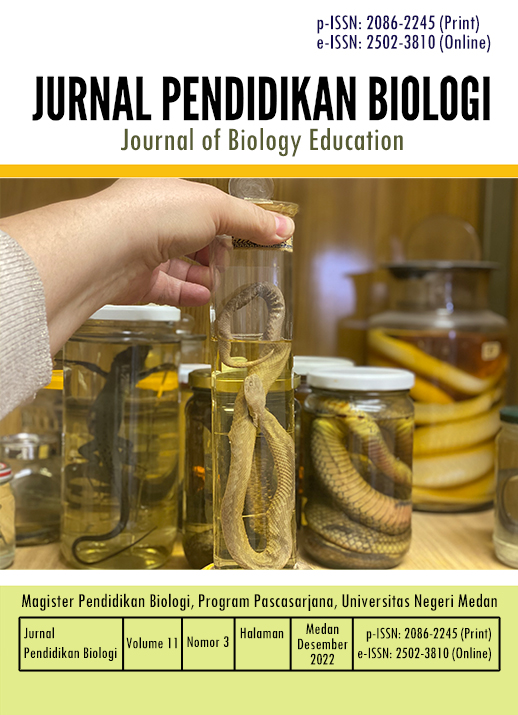The Use of Contextual Models in Improving Student Learning Outcomes and Social Skills in Science Learning in Junior High Schools
DOI:
https://doi.org/10.24114/jpb.v11i3.40857Keywords:
Contextual Models, student learning outcomes, Social Skills, Science learningAbstract
This Research is motivated by the low learning outcomes and low social skills of students in science learning. The reality in the field is that students experience difficulties in understanding concepts about inheritance material and the difficulty of students communicating, collaborating in discussion activities during learning. The aim of the research is to improve student learning outcomes and social skills in the matter of inheritance in natural science subjects. This study uses a contextual model with 2 cycles. Based on research results on the use of contextual models can improve learning outcomes and students' social skills in learning natural sciences at SMP Negeri 1 Percut Sei Tuan. This is evidenced by the acquisition of student learning outcomes increasing in each cycle and exceeding the Minimum Completeness Criteria (KKM) score limit of 75. The number of students who completed the first cycle was 18 students (5 6.25 %) and those who did not complete their studies 14 students (43.75 %). After making improvements in cycle II, the percentage of students' learning outcomes was increased by 87.50 % and only 4 students who had not finished with a percentage of 12.50 %. In cycle I students' social skills for aspects of working with friends 75%, aspects of showing social responsibility 62%, aspects of controlling emotions 40.63%, aspects of interacting with others 43.75%, aspects of participating 59.38%, cultivating sportsmanship, discipline and healthy living 51.56%. After implementing improvements in cycle II there was a significant increase in aspects of working with friends (95.31%), showing social responsibility (87.5%), controlling emotions (56.25%), interacting with other people (93.75 %), participating (82.81%), cultivating sportsmanship, discipline and healthy living (62.5%), writing opinions/ideas (73.44%), leading (70.31%).References
Adang H, Darmaji, & Arip S. (2012). Metodologi Pembelajaran Kajian Teoritis Praktis Model, Pendekatan, Strategi, Metode, dan Teknik Pembelajaran. Banten: LP3G.
Ahmadi, A. (2004). Sosiologi Pendidikan. Jakarta: Rineka Cipta.
Depdiknas. (2009). Pengembangan Model Pendidikan Kecakapan Hidup. SD/MI/SDLB “ SMP/MTs/ SMPLB “ SMA/MA/SMALB/ SMK/MAK.
Depdiknas. (2009). Pengembangan Model Pendidikan Kecakapan Hidup. Jakarta: Balitbang, Pusat Kurikulum.
Dudung, A. (2018). Kompetensi profesional guru (suatu studi meta-analysis desertasi pascasarjana UNJ). JKKP: Jurnal Kesejahteraan Keluarga dan Pendidikan, vol 5 (2). http://doi.org/10.21009/JKKP.
Fauzi,I. (2018). Etika Profesi Keguruan. Jember: IAIN Jember Press.
Kadaryanto, (2007). Biologi 3. Jakarta, Yudhistira.
Komalasari, K. (2010) Pembelajaran Kontekstual Konsep dan Aplikasi. Bandung: PT Refika Aditama.
Mulyono, A (2018). Anak Berkesulitan Belajar. Jakarta: Rineka Cipta.
Trianto. (2007). Model-model Pembelajaran Inovatif Berorientasi Konstruktivistik. Konsep, Landasan Teoretis “ Praktid dan Implementasinya. Jakarta: Prestasi Pustaka Publisher.
Vallori, A.B. (2014). Meaningful learning in practice. Journal of Education and Human Development, 3(4), 199-209.
Warsono & Hariyanto. (2013). Pembelajaran Aktif: Teori dan Asesmen. Bandung: PT Remaja Rosdakarya.
Downloads
Published
Issue
Section
License
Copyright (c) 2023 Jurnal Pendidikan Biologi

This work is licensed under a Creative Commons Attribution 4.0 International License.
Copyright
Penyerahan naskah menyiratkan bahwa karya yang diserahkan belum pernah diterbitkan sebelumnya (kecuali sebagai bagian dari tesis, laporan, atau abstrak). Naskah tidak dipertimbangkan untuk publikasi di tempat lain. Penerbitannya telah disetujui oleh semua penulis bersama. Jika dan kapan naskah diterima untuk publikasi, penulis masih memegang hak cipta dan mempertahankan hak penerbitan tanpa batasan. Penulis atau orang lain diperbolehkan untuk melipatgandakan artikel selama tidak untuk tujuan komersial. Untuk penemuan baru, penulis disarankan untuk mengelola patennya sebelum diterbitkan.
Open Access
Jurnal ini berkomitmen untuk membuka akses bebas yang tidak membebankan biaya kepada pembacanya atau lembaga mereka. Pembaca berhak membaca, mengunduh, menyalin, mendistribusikan, mencetak, mencari, atau menautkan ke teks lengkap artikel, selama tidak untuk tujuan komersial. Jenis lisensi adalah CC-BY-4.0.
Disclaimer
Tidak ada tanggung jawab yang dikenakan kepada Penerbit atau oleh editor untuk kesalahan dan/atau kerusakan pada naskah sebagai akibat dari pernyataan pencemaran nama baik atau dugaan pencemaran nama baik, pelanggaran hak kekayaan intelektual atau privasi, atau kewajiban produk, baik akibat kelalaian atau sebaliknya, atau dari penggunaan atau operasi ide, instruksi, prosedur, produk atau metode apa pun yang terkandung dalam materi di dalamnya.

